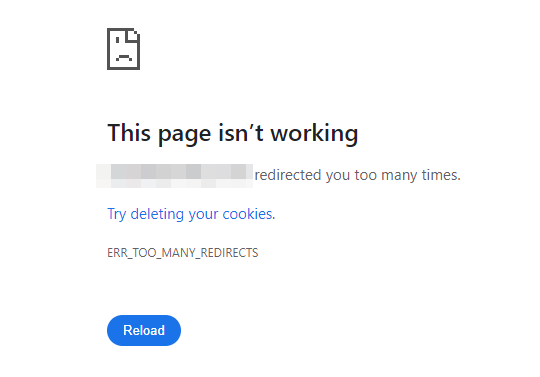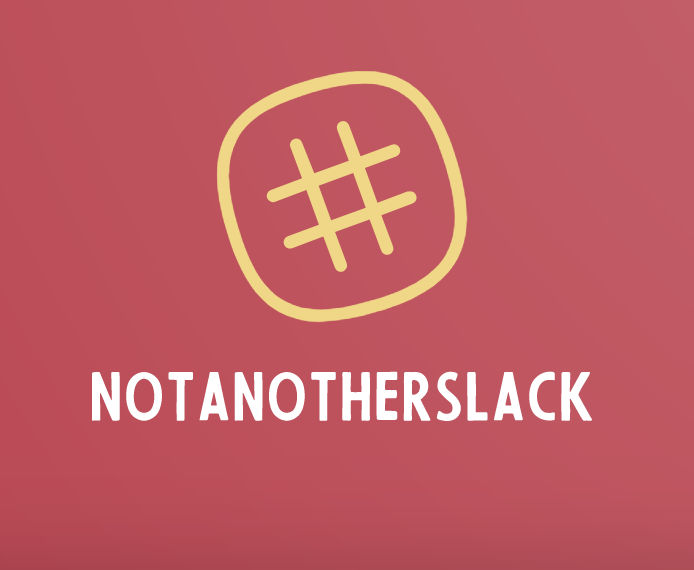Just about every man and his dog has been talking about ChatGPT recently, and about just how brilliant it is. Not one to be left out, I've been playing around with it myself to see what all the fuss was about. I can see so many interesting ways it can be used to assist an SEO consultant in their day-to-day work - and so decided to ask around the SEO and digital marketing community to see how they've all been making use of it.
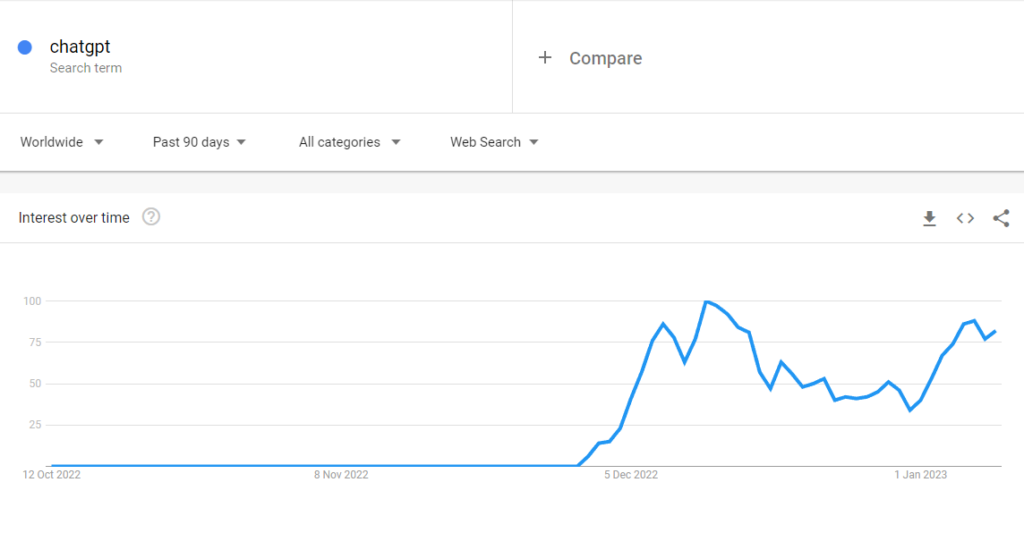
Hopefully in this piece you will find some great examples of using ChatGPT to make your life easier as an SEO. Whilst I can't really comment on the ethics of using ChatGPT (particularly if you are using it to create content for your site), it's clear that there will be many technical-case uses whereby it's going to save people a lot of time, and bring the skills barrier down.
Notes on using ChatGPT 📝If you haven't yet tried it out remember it's currently free to use whilst it's in the "research" phase - to do so you can register for an account at OpenAI.com and then select to open ChatGPT - from there you can enter chat prompts where you give instructions / ask questions to the tool. At some point soon they will introduce a paid credits system - so you may want to take your chance to play around whilst it's still free to use 💰
Wait - can we use ChatGPT to write content? 🤔
Outside of the interesting ethical and moral issues that might arise from using it (it's my understanding that ChatGPT has "learnt" from consuming many other articles on the web - and has been caught "plagiarising" existing articles), I personally don't think ChatGPT content is good enough to use out of the box without human editing and enhancing. However, there's no denying that it's a great tool for creating a framework for an article or for helping with research.
However, from my own research and findings on Twitter I've seen that CNET have infact been using AI generated articles - Futurism.com covered this topic a few days ago. Another interesting development was that BankRate.com, a huge financial site has also begun using AI to generate content. At time of writing there appears to be 169 articles published by them that have been AI generated.
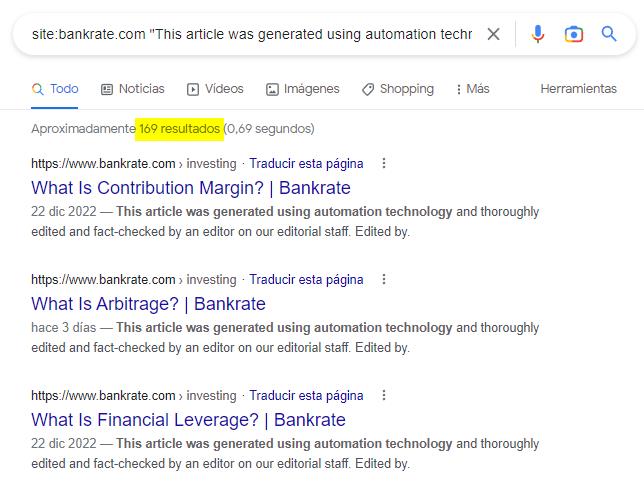
I think many within the SEO and publishing industry are keen to hear Google's own thoughts on the matter. John Mu has stated before that AI generated content may fall under the spam radar, so if Google catches it on a site then they may be in trouble. But with such big sites like BankRate.com openly using AI generated content, this puts a bit of a spanner in the works.
As with most things I don't think there's a blank-and-white approach here. Perhaps because of the size/authority of publishers like CNET, and with them being transparent about their usage, I imagine they'll be allowed to do so without penalisation from Google. That will likely frustrate many sites that lack the size, authority and trust to be able to use AI content in a similar fashion.
Note - On 12/01 Google apparently "clarified" their stance on using AI content (to clarify meaning in this case, to further complicate the issue) by making a serious of vague tweets about it, which can be read in more detail here at SERoundTable.
I'm interpreting this as follows - if you're using AI to generate content, don't make it obviously spammy - or clearly done solely to grow SEO traffic. Ensure you're covering those EEAT principles (expertise, events, authority and trust). Get a human to proof-read and verify everything before you hit publish.
How other SEO's and Marketing Experts are using ChatGPT to assist with SEO
I spoke with over 20 different SEO and marketing specialists to get their thoughts on using ChatGPT as part of their marketing or SEO processes. I've also included a few nice bits of advice from other specialists as I've come across on the web. Here's what they had to say...
#1 - Assisting Keyword Research by Classifying Search Intent
ChatGPT can easily be fed a list of keywords that you can ask to be classified according to search intent, which is usually along the lines of "informational, commercial or navigational". Being able to classify keyword intent fairly quickly in this manner can be a bit of a lifesaver, particuarly for those who use SEO keyword research tools that don't include this feature (cough cough *Ahrefs*).
Being able to classify keywords by their intent is a very important part of the keyword research process as it will help determine the kind of article you will need to create in order to rank well organically. The only downside to using ChatGPT for this is that it's a bit cumbersome to copy and paste in/out of the tool - but I imagine that will improve in the future, or you can make use of GPT-3 instead to help.

Adam Brown, SEO Consultant at AdamBrown.uk
#2 - Helping with Link Building Processes by Tweaking Google Sheets Formulae
I immediately started using ChatGPT to create Google Sheets formulas that would strip out the rows of specific domains when doing a manual competitor link analysis for my clients. While this is something I could have done before, ChatGPT has become a much more efficient way of trialling and testing these processes without the headaches of having to actually create the formulas.
For someone like myself who certainly isn't a whiz with Google Sheets formulas, it has saved me so much time (not only in creating quality formulas but also by reducing the amount of manual analysis required when link prospecting for my clients).

James Taylor, Founder, Digital Tool Report
#3 - Creating Schema Code
One of the best uses of ChatGPT I've seen so far for SEO is the ability to produce schema code, whether it's for a book review or FAQ.
While some people may use plugins to help embed schema into a website if they're using a CMS, those who write and embed code manually will find the schema code ChatGPT produces to be a good starting point that saves time.
Using the template code, they'll be able to amend the schema so it's filled with data relevant to their project.

Steph Andrusjak, Freelance SEO Consultant, SEO Steph
#4 - Helping Brainstorm Improvements
My favourite use case of ChatGPT so far is being able to start from a blank slate and start generating ideas for a new campaign or piece of content. I have found that ChatGPT and other similar tools are great for simple and quick ideas, for suggesting improvements on something that's already good, or when you're starting from scratch and planning your strategy.
I haven't yet seen a case where ChatGPT can understand a company's business model, figure out an ICP's jobs to be done, and decide on a full-blown content strategy based on competitive gap analysis informed keyword opportunities. I will definitely keep my fingers crossed, though.

Ken Marshall, Chief Growth Officer, RevenueZen
#5 - Showing SEO Consultants What Not to Write About
ChatGPT has a long way to go before it replaces a skilled SEO consultant. In fact, the best example of what ChatGPT can do right now is to show an SEO specialist what NOT to write about.
Even the best AI Chatbot is simply a reflection of content that already exists. And, in today's competitive web environment, you will not get far with redundant content. What you need is an SEO strategy that makes your page stand out.
So, run those keywords or queries through ChatGPT to ensure your content gives the reader something different or more thorough than what the bot offers. Otherwise, you're likely just regurgitating content that's already out there.

#6 - Coding Free Tools that Act as Link Bait
Providing a useful free tool can be a highly effective way to get backlinks, as it can serve as link bait. Many software-as-a-service (SaaS) companies, such as Ahrefs, use this method by offering tools such as a keyword generator and a backlink checker.
Ahrefs' free keyword generator alone has garnered over 9,000 backlinks, which, you can imagine, adds some sweet "link juice" to their website's domain and URL rating. While it may not be possible for ChatGPT to develop tools of this calibre, it can still create functional tools, such as a QR code generator, for SEO consultants to offer to their clients.
In addition to creating the script for the tool, ChatGPT's NLP algorithm can also generate the content for the page, which includes various semantic keywords. Ultimately, this allows SEO consultants to provide more value to their clients without needing to engage a developer for a technical task like this.

Brendan Aw, Content Marketer, SEO Specialist, & Content Creator, BrendanAw.Com
#7 - Optimizing FAQs and Featured Snippets
This data can improve existing content and create new, optimized pages that are more likely to appear as featured snippets or at the top of search engine results. ChatGPT can also help identify opportunities for using FAQ and featured snippets to drive organic traffic.
By leveraging ChatGPT, SEO consultants can quickly identify opportunities for using FAQ and featured snippets to answer common customer questions and provide answers faster than traditional search results can. This is a great way for businesses to remain competitive in the ever-changing digital landscape.

Yusuf Shurbaji, Co-Founder & Managing Partner, Prismfly
#8 - Creating JavaScript Snippets to Extract Data from a Web Crawl
I used it to help me create a JavaScript snippet that I wanted to use to extract some data when running a web crawl. It was great to use as a starting point to get some ideas/code which I could then further refine and use. It was just a case of deciding how best to phrase the question, clearly define the parameters and how it should be output. Obviously it’s not perfect but having a starting point and code example created to test and modify straight away felt a lot quicker than some of my usual methods.
I realise this isn’t a content related answer but I just love how many different ways it can be used.

Michelle Race, Senior Technical SEO at Lumar
#9 - Using ChatGPT as a Tool - Not Replacing a Person or Process Completely
Plenty has been written on ChatGPT already & there is loads of hype about it being the death of "..."
I think the most effective uses will come when people become more expert at using it as a tool rather than expecting it to replace a person or process completely.
If you can train yourself to get the most from it and recognise the most suitable use cases for it it will be invaluable.
This relies on the human expert using the AI to augment their skills - as described in the Centaur Model.
These are the types of use cases we're investigating at ARC and asking where can Chat GPT (or any other new tool) help improve our outputs without sacrificing quality or becoming a distraction.
I'd be interested to hear what everyone else is doing.

Tom Pratt, Charity Marketing Consultant at Albert Road Consulting
#10 - Finding Topics that are Missing From Existing Content
When looking to optimise existing content on the website, we can ask ChatGPT to come up with a list of subtopics that we are missing on the page.
Simple ask ChatGPT to “Provide a list of semantically relevant topics that are missing from this” and below that paste the existing article.
ChatGPT will provide a list of topics that are semantically relevant but missing from your page.

Sarvesh Shrivastava, SEO Consultant.
#11 - Assisting with Research during the Content Creation Process
So far I've found that ChatGPT is helping considerably in the research stage of my content workflow.
In particular, it's been great at creating structure of content and knowing 'what' to write on topics that I might not be too knowledgeable about.
E.g. if it's a 'five key benefits of {topic}' article then it hits the mark with the benefits on par with what I could do with research!

Charlie Penwarden, Growth Marketer at Penwarden.co.uk
#12 - Levelling the Playing Field when it comes to Idea Execution (eg No Code Solutions!)
I've been listening to this podcast during the week.
Interesting idea that's sticking with me... ideas are often worthless, it's all about the execution. What ChatGPT has done is completely level the playing field of execution.
And so, now it's the ideas that are really valuable.
This seems to be the dividing line at the moment. Those who may lose their job to ChatGPT, and those who can harness it to do incredible things.

Gareth K Thomas, Business and Strategy Consultant at The Clarified Company
#13 - Using ChatGPT to generate JSON markup for structured data
ChatGPT seems to be dividing marketers. Anti ChatGPT marketers claim that the tool creates soulless content. Others are ranking websites with content that solely written by AI tools. The usefulness of ChatGPT in SEO is – as it often is – somewhere in the middle.
ChatGPT can, without doubt, take the heavy lifting for marketers. You’ll write an article faster than you could without it. You can even generate schema in minute without bothering your dev; try asking ChatGPT to ‘create FAQ schema for questions relating to [subject].
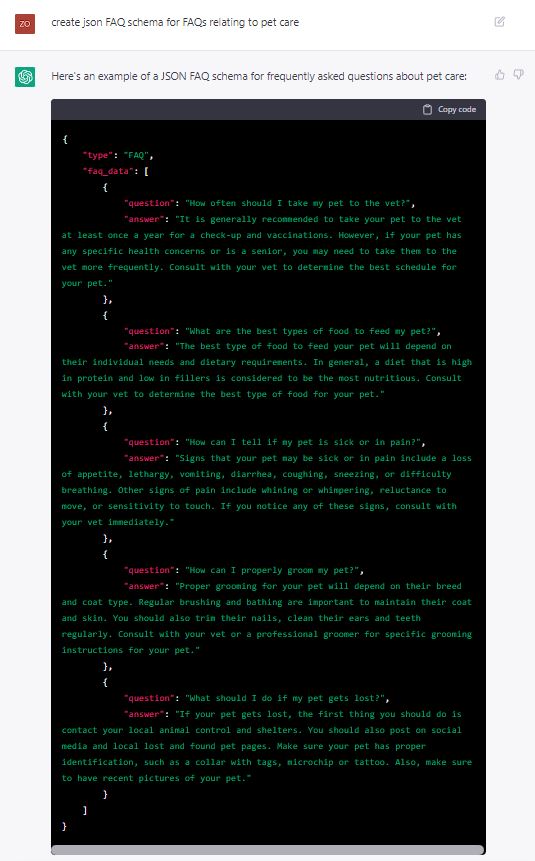
But ChatGPT will always fall short of human efforts. Everything ChatGPT produces needs to be thoroughly edited and fact checked. If you want to create a strategy using ChatGPT, then do. But if you want to sleep easy next time Google rolls out an algorithm update, just make sure you’re injecting that human soul into everything that makes its way into your marketing and onto your site.
Even ChatGPT know where it fits into the role of marketing. ChatGPT is an excellent aid, but it won’t replace humans anytime soon. Remember users first. If you’re serving users, you’ll be rewarded by Google, later.

Zoe Ashbridge, Senior SEO Specialist at forank.com
#14 - Develop Engaging Content & Helping With Creativity
Utilising GPT3 we have identified x3 core areas where it helps us. In the realm of content generation, it fast tracks content ideas and provides a base template to work off. By feeding the machine we can quickly develop engaging relevant content, that saves time and hassle. Then we can take over to refine the content so that it has a more human touch as the finished article.
For creativity, we use GPT3 as an open Q&A to help undercover new content themes, permutations or topic ideas. This allows us to expand our choice of target terms and identify new keyword opportunities. Whether we are stuck on a particular tone of voice or struggling to find the right vocabulary to use, GPT3 assist us in rephrasing content and in exploring alternative approaches to content.
Within technology we have been using GPT3 to write out complex Excel formulas/Macros and RegEx formulas for Google DataStudio. By feeding GPT3 with the right logic we are able to take large pieces of raw data and use the platform to help us right out formulas that help us undercover valuable insights. This helps saves a great deal of time manually writing out formulas and provide a much more dynamic way of investigating raw data sets.
We see GPT3 as a new addition to the marketing tool kit which helps us work faster, smarter and allows us to think outside the box for ideas. We always ensure that the final product has a human touch to ensure the right checks and balances are in place, but we welcome the advances in this field of technology to help us leverage machine learning for SEO.

Jasmine McKenzie, Marketing Manager at Absolute Digital Media
#15 - We ask ChatGPT the Questions our Customers Are Asking, Helping With Our Content Creation Process
We've started using ChatGPT for a few projects. I've always said you can't manipulate search engines and you sure as hell can't manipulate your buyers. Wrote about this topic years ago, before AI was common.
In regards to using ChatGPT, as SEO writers and marketing strategists we understand that search engines are looking for answers to people's questions. Therefore, regardless of the project we start by asking the right questions. Then we create content that revolves around those questions, by resolving the person's problem. Sometimes we go a couple of questions deep into the prompts, while with other clients we are looking for resources that will add value to those answers. Remember, we're not here to manipulate the search engines, or readers, we're here to give our readers, buyers, and clients the answers.
So yeah, we shamelessly use ChatGPT as an assistant to the content director, paralegal to the lawyer, nurse to the doctor. We're the experts, ChatGPT is informant as it were.
Ultimately, we are focused on creating compelling and relevant content that resonates with users: doing so with the help of ChatGPT goes a long way towards achieving those coveted top SERP rankings!

Gabriella Sannino, Owner of Level343.com
#16 - Creating a Python Script that can Scrape and Extract Web Data before Writing Meta Titles & Descriptions
I spent an afternoon using it to teach me how to code a Python script that would scrape data from a list of URLs and extract content elements, then use OpenAI’s davinci to summarise the content, write titles and meta descriptions. The goal was to learn a bit of Python and have a first draft of tags to optimise for the website. The script I made totally worked and I learned a lot!
I sometimes struggle to find the right words to explain concepts to clients, or I fall into the habit of using technical jargon in my emails, but forget to decipher those terms for my clients. I use ChatGPT to help me explain concepts in a few lines, or simplify the syntax in my emails.
I’m also testing it to write alt tags for images, draft ideas for blog posts, etc. I want to emphasise that it’s mainly to give me a good starting point on redundant tasks, more than doing the work for me.
I also play around with NotionAI for documentation, or to re-write pieces of text in some deliverables.

Alizée Baudez, SEO Consultant at AlizeeBaudez.com
#17 - Ways to Use ChatGPT to Help with Digital PR Efforts
While I don't think that in digital pr we'll be being replaced by computers just yet, (although they seem to be getting very close to passing the Turing test so who knows!) there are some key ways in which you can use ChatGPT for digital pr.
Ideation - there are a few different ways it can help you with ideation, a really fun one (I stole this from Mark Rofe @iamrofe on Twitter) is to get chat ChatGPT to give you a list of headlines on a given subject, and then you can work back from there.
You can also use it to figure out what problem your target audience might be having, by asking ChatGPT for example:
'What are some common problems faced by motorists in the UK?'
Content Creation - now, I have to caveat this with, please do not send journalists content written purely by ChatGPT without a human edit. However, if you're struggling to get started on that expert comment, ChatGPT can be useful to give that start when you're staring at a blank screen and a ticking clock.
Research - In digital, PR often need to be experts on anything and everything from construction to finance. When you're short on time but need to get to grips with a new niche, chat GPT can be a great one-to-one teacher on anything from skincare to the stock market. You can get specific answers to help you learn quickly without needing to wade through pages of academic papers.

Jo O'Reilly, Digital PR Manager at Salience.co.uk
#18 - Using ChatGPT to create frameworks for structured data
Chat GPT-3 provides a brilliant way to not only speed up content creation and ideation, but also to create things like JSON schema code.
As SEO's, schema is a vital part of our strategies but can often take a long time to write out - especially if you're new to schema or are not code-savvy.
I think we've probably all been there when we've written out a string of JSON only to run it through the rich snippet test and discover there's a comma or bracket in the wrong place. I've recently been testing Chat GPT-3 on this, and while it won't provide code populated with company information, it can provide the framework where you then just need to fill in the blanks.
For me, I think Chat GPT-3 has the potential to be a huge time saver and just make our lives far more efficient.

Catherine Lux, Head of Content Marketing at Veeqo
#19 - Using ChatGPT for Generating Client Content Ideas
I was experimenting with it when working with a client to generate content ideas. We asked it to write an article using their tone of voice and it was about 90% accurate, give or take some Americanisms and repeated adjectives.
I can see it being incredibly useful as another tool in the marketing content kit.

Maria Soleil, Marketing Strategist at Soleil Marketing
More ChatGPT SEO Resources ⭐
I was admittedly a bit slow to write and publish this piece - many great SEO's have beaten me to it! I've linked to a few other great resources on ChatGPT below, as well as some other great tips on using AI as part of your SEO efforts:
#20 - Chrome Extension with handy Prompts for SEOs from Christoph C Cemper
Christoph C. Cemper created a great Chrome Extension called AIPRM for SEO which allows you to quickly access specific SEO prompts within ChatGPT - not only does this save a lot of time but it also saves you the cognitive load of thinking how exactly you would like to use the tool.
I think that's a great way for new people to begin to try using the tool - perhaps those who are struggling to find good uses in their day-to-day life as an SEO.
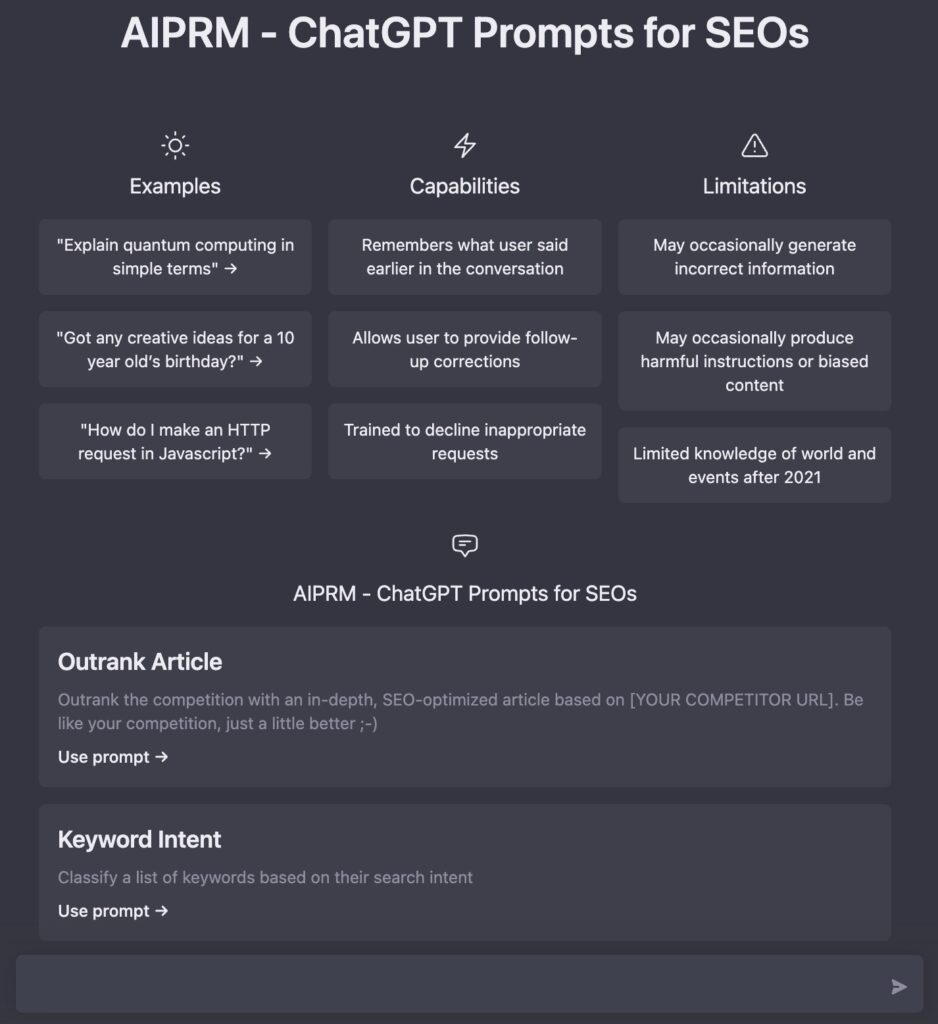
#21 - Aleyda Solis' guide on using ChatGPT for SEO
If you're looking for more classical SEO use cases of ChatGPT for SEO - writing page titles, creating htaccess file rules, sorting out hreflang tags and just about anything in between - Aleyda Solis wrote a very comprehensive piece here.
#22 - Joe Hall's advice on using ChatGPT for technical SEO
Joe Hall wrote a nice piece that covers using ChatGPT for technical SEO - including things like creating an XML sitemap based on some provided URLs, and making custom robots.txt files based on the rules you request.
#23 - Danny Richman's guide on using ChatGPT to answer HARO pitches
Another SEO consultant and trainer, Danny Richman, did a brilliant guide on using ChatGPT, Zapier and some other tools to automate finding and pitching for links on HARO.
Note that whilst this isn't using solely ChatGPT (it also makes use of GPT-3), I thought it was well worth including here as it was such a handy resource. It does take a bit of effort to get this setup, and it seems to work well at finding relevant opportunities, but I'm not sure I'd rely on it to write the journalist pitch entirely. I prefer to handle that final part of the puzzle - I'm sure journalists don't want to be hit with AI generated pitches - they probably get enough rubbish as it stands! 😅
Some concerns around using ChatGPT 😬
There are clearly some concerns around using ChatGPT, and risks to assess if you are going to start publishing content from it - PR specialist Roz Edwards also had the following to say:
I’m fascinated by using AI to generate content but I’ve not yet used it. My main reason is a fear of promoting laziness and making misinformation normal, resulting in a trend of believing or not believing every future piece of written content. Especially if it’s something the media will use without question.
However, I can see the benefits of using it in a time sensitive space, or to alleviate writers block, providing that the person instigating it has knowledge and experience of the subject enough to ‘hand edit’ or rewrite.
Interestingly in the art world, there is a fear of having others reproduce your art and claiming it as their own. This is where my biggest concern lies as art is a human creation that evokes connection and conversation.
I may give it a go yet with the written word, but only on subjects I know about and have the integrity to use it for inspiration, rather than it do the work for me.

Roz Edwards, Digital PR Mentor at RozEdwards.co.uk
Anything to add on using ChatGPT to help with your SEO efforts? 📈
What are your thoughts - how have you been using ChatGPT to help with your own SEO processes.
Or - are you choosing not to do so?
Whatever you've got to say feel free to leave a comment below 👇



